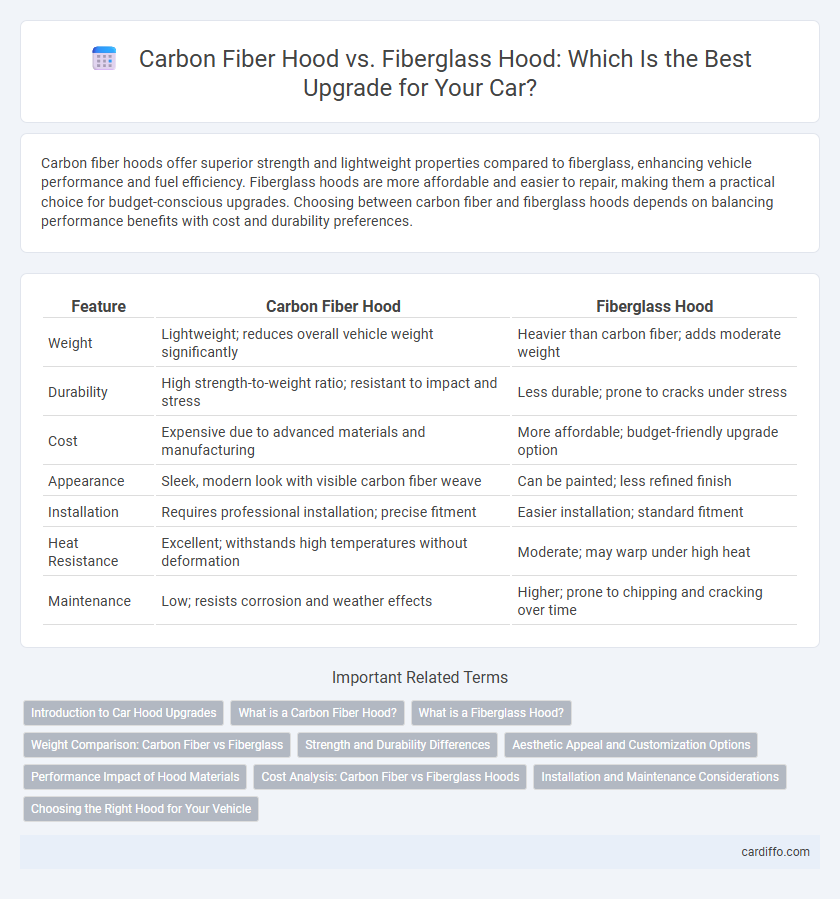Carbon fiber hoods offer superior strength and lightweight properties compared to fiberglass, enhancing vehicle performance and fuel efficiency. Fiberglass hoods are more affordable and easier to repair, making them a practical choice for budget-conscious upgrades. Choosing between carbon fiber and fiberglass hoods depends on balancing performance benefits with cost and durability preferences.
Table of Comparison
| Feature | Carbon Fiber Hood | Fiberglass Hood |
|---|---|---|
| Weight | Lightweight; reduces overall vehicle weight significantly | Heavier than carbon fiber; adds moderate weight |
| Durability | High strength-to-weight ratio; resistant to impact and stress | Less durable; prone to cracks under stress |
| Cost | Expensive due to advanced materials and manufacturing | More affordable; budget-friendly upgrade option |
| Appearance | Sleek, modern look with visible carbon fiber weave | Can be painted; less refined finish |
| Installation | Requires professional installation; precise fitment | Easier installation; standard fitment |
| Heat Resistance | Excellent; withstands high temperatures without deformation | Moderate; may warp under high heat |
| Maintenance | Low; resists corrosion and weather effects | Higher; prone to chipping and cracking over time |
Introduction to Car Hood Upgrades
Carbon fiber hoods offer superior strength-to-weight ratio and enhanced durability compared to fiberglass hoods, making them ideal for high-performance vehicle upgrades. Fiberglass hoods are typically more affordable and easier to mold for custom designs, appealing to budget-conscious enthusiasts. Selecting the right material for a car hood upgrade impacts weight reduction, heat dissipation, and overall vehicle aesthetics.
What is a Carbon Fiber Hood?
A carbon fiber hood is a lightweight, high-strength automotive part made from carbon fiber reinforced polymer, known for its superior durability and resistance to heat compared to traditional materials. It offers significant weight reduction, improving vehicle performance, handling, and fuel efficiency. Carbon fiber hoods also provide enhanced aesthetics with a sleek, modern appearance preferred in automotive upgrades.
What is a Fiberglass Hood?
A fiberglass hood is a lightweight car body component made from woven glass fibers embedded in resin, known for its cost-effectiveness and ease of customization. It offers moderate strength and durability but is generally heavier and less heat-resistant compared to carbon fiber hoods. Fiberglass hoods are popular in automotive upgrades due to their affordability and ability to be molded into various shapes for aesthetic enhancements.
Weight Comparison: Carbon Fiber vs Fiberglass
Carbon fiber hoods typically weigh 40-60% less than fiberglass hoods, offering a significant advantage in reducing vehicle weight. A standard carbon fiber hood can weigh around 6-8 pounds, whereas fiberglass counterparts often range between 10-15 pounds. This weight difference enhances acceleration, handling, and fuel efficiency, making carbon fiber the preferred choice for performance upgrades.
Strength and Durability Differences
Carbon fiber hoods offer superior strength-to-weight ratios compared to fiberglass, providing enhanced durability and resistance to impact and deformation under high stress. Fiberglass hoods, while generally more affordable, are prone to cracking and weakening over time due to their less flexible and more brittle structure. For performance upgrades requiring long-lasting resilience and weight savings, carbon fiber remains the preferred material given its robustness and longevity in demanding automotive environments.
Aesthetic Appeal and Customization Options
Carbon fiber hoods offer a sleek, modern aesthetic with a distinct weave pattern and glossy finish that appeals to performance enthusiasts seeking a high-tech look. Fiberglass hoods provide greater versatility in customization, allowing for complex shapes, vents, and unique designs tailored to individual styles and vehicle models. Both materials enhance visual appeal but cater to different preferences: carbon fiber emphasizes lightweight sophistication, whereas fiberglass prioritizes design flexibility and personalization.
Performance Impact of Hood Materials
Carbon fiber hoods offer significant weight reduction compared to fiberglass hoods, improving acceleration, handling, and fuel efficiency due to lower overall vehicle mass. Their superior strength-to-weight ratio enhances durability while maintaining rigidity, which benefits high-performance driving dynamics by reducing chassis flex. Although fiberglass hoods are less expensive and easier to repair, they add more weight, negatively affecting the car's power-to-weight ratio and responsiveness.
Cost Analysis: Carbon Fiber vs Fiberglass Hoods
Carbon fiber hoods typically cost between $800 and $2,000 due to the material's lightweight properties and manufacturing complexity, while fiberglass hoods range from $200 to $600, offering a more budget-friendly option but with increased weight and lower durability. The higher price of carbon fiber hoods reflects their superior strength-to-weight ratio and resistance to corrosion, making them ideal for performance upgrades with long-term value. Fiberglass hoods, although affordable, may incur additional expenses over time due to potential cracking and frequent repairs or replacements.
Installation and Maintenance Considerations
Carbon fiber hoods offer a lightweight and durable upgrade but require precise installation techniques due to their brittle nature, often necessitating professional alignment and specialized hardware to avoid damage. Fiberglass hoods are easier to install with standard mounting points and tools, making them suitable for DIY enthusiasts, but they may need regular maintenance like sanding and painting to prevent cracks and finish wear. Maintenance for carbon fiber includes inspecting for stress fractures and using mild cleaning agents, while fiberglass demands more frequent attention to surface repairs and protective coatings.
Choosing the Right Hood for Your Vehicle
Carbon fiber hoods offer superior strength-to-weight ratios, enhancing vehicle performance by reducing overall weight and improving acceleration and handling. Fiberglass hoods provide a more affordable option with easy moldability for custom designs but are heavier and less durable than carbon fiber. Choosing the right hood depends on balancing performance needs, budget constraints, and desired aesthetic customization.
Carbon Fiber Hood vs Fiberglass Hood Infographic

 cardiffo.com
cardiffo.com